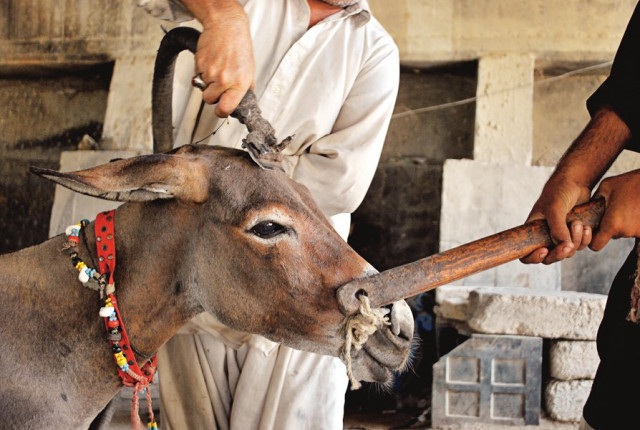The be[a]st groomer
When it comes to looking good, animals may not be too far behind.

A DONKEY GETS A HAIRCUT AT GHAZANFAR ALI’S SHOP WHERE CLIENTS MUST BOOK A PRIOR APPOINTMENT. PHOTOS: ARIF SOOMRO
The shop was set up by Ali’s forefathers decades ago, but he has now taken on the responsibility to keep the tradition alive. “When I was 10 years old, I worked with my uncle and he taught me a lot. A decade later, in my early 20s, I established my own shop here,” he says. Most of his family is involved in the same line of work in different areas of Karachi.

Zameer Ahmed is seen working at his roadside hoof care shop, trimming and fitting a donkey hoof. PHOTOS: ARIF SOOMRO
Despite the volatile reality of the area, business is steady. The residents mostly belong to the labour class and work in the Shershah scrap market or the Jodia Bazaar nearby. “This is the best place to make money and you don’t need to worry about the rent or other taxes,” Ali explains, who doesn’t need to worry about unhappy customers either.
Business is at its peak on Sundays or public holidays, since the markets are closed and the owners have the time to pimp up their animals. “On Sundays, we usually have more than 50 animals and don’t even get time to have lunch or tea,” says Ali. The most frequent clients are the ones who take their animals to participate in races, and hence looking good is on top of their priority list. These clients come to the barber shop at least twice a month.
Service charges vary according to the size of the animals: Rs500 for a horse, Rs250 for donkeys, mules, goats and sheep and camel owners have to pay up to Rs600.
To trim the long animal tresses, locally produced electric trimmers are used. They are powered by generators and need to be sharpened on stone every day.

A sheep gets a haircut with the help of an electric trimmer at Ghazanfar Ali’s shop. PHOTOS: ARIF SOOMRO
“These animals are our source of livelihood and we love them like our children. We want them to look fresh and beautiful which is why we come here,” says one of Ali’s clients who had brought his donkey to have it spruced up. However, due to inflation, it is becoming increasingly difficult to even buy and keep relatively low-maintenance animals like donkeys. “These days, the price of a healthy donkey ranges from Rs80,000 to Rs100,000 and the cart can cost anywhere between Rs25,000 and Rs30,000. It is a big investment for us,” he explains. The rising cost of animal food and the deteriorating law and order situation in the city also make it difficult for owners to make ends meet.
But animal-lovers like Ali and Zameer Ahmed, who operates a hoof care shop a couple of miles away, try to provide value for money to their clients. Ahmed has also been in the business for over a decade but his work involves trimming and balancing hooves along with fitting horseshoes. The shop’s strategic location, next to the famous tonga shop in Lyari keeps business up and running.

“For trimming the hooves, we charge Rs250 for a horse or donkey and Rs100 for goats and sheep,” says Ahmed. Trimming and fitting of the horseshoe, however, cost a little more; Rs500 for horses and Rs400 for donkeys. Ahmed uses expensive horseshoes which are made from a superior quality metal, and takes extra care while trimming the hooves. These services come at a higher price which is normally double the usual rate.
The work may seem ordinary but there is dedication and pride in these men’s voices who want to keep the craft alive, despite limited returns. Ali wants his son, whom he has trained under his careful supervision, to take the reins from him and tame unruly animal hair even after his grooming days are over.
Arif Soomro is a freelance photographer.
Published in The Express Tribune, Sunday Magazine, February 16th, 2014.



















COMMENTS
Comments are moderated and generally will be posted if they are on-topic and not abusive.
For more information, please see our Comments FAQ